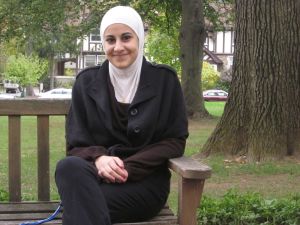
For most Americans, the idea of war happening close to home isn’t easy to imagine. War, to Americans, is a foreign thing, something that happens overseas and out of sight. But for others, war is a daily reminder of how precious their lives are. For them, war is reality.
Rasha Sharhan, junior math major, was 13-years-old when the war in her home country of Iraq began.
“It went on from March 20 until April 15,” Sharhan said of the first attacks, which occurred in 2003. “During this time, we just stayed at home because we weren’t sure if it was safe.”
Sharhan is a refugee. She and her family sought safety in the U.S. while the war in her homeland ultimately made it unsafe for them to stay there. Born and raised in Baghdad, Iraq, even her earliest memories involved the concept of war. The attacks that President George H. W. Bush ordered in response to Iraq’s invasion of Kuwait in the early 1990s, only a few years after Sharhan was born served as a precursor to the greater occupation of Iraq in recent years.
“After the war, things got better. It was heartbreaking to see what happened, though. It was surreal,” Sharhan said
She and her family immediately left their home, seeking shelter in her grandparents’ apartment. On the way there, Sharhan remembered seeing “fluttering pages in the air,” the Iraqi library was right along the street leading to her grandparents’ apartment, and it was burning.
Finding themselves safe, however, things for the most part seemed to return to normal for a while, anyway. “We went back to school,” Sharhan said. “There was looting but no more bombs.” In a short amount of time, though, the bombs began again and Sharhan and her family began to receive threats over the phone.
“We went three places in Baghdad [from there], but after a while, my dad’s best friend was killed,” Sharhan said. The murder of her father’s friend, as well as the murders of her own friends’ fathers, sparked yet another move for the Sharhans. “We packed whatever we could and went to my aunt’s in Jordan.”
The country of Jordan borders Iraq to the west, with only a small part of its eastern-most section connecting it to Iraqi soil.
Sharhan stayed in Jordan for about two and a half years. Luckily for her, after two months’ time spent in Jordan, a bill was passed that allowed all Iraqi children, regardless of whether or not they were legal residents, to attend school. Because of this, she was able to finish high school.
“That was the first time that I wanted to go to school,” Sharhan joked.
After she completed high school, her family applied for official refugee status. “It took six months to get approved to come to the U.S.,” Sharhan said.
“At first,” she continued, “I didn’t like it here. I had so many friends in Baghdad. It was so hard. And I knew people here spoke English, not Arabic. It was so different. And yet, people here, they were so nice.”
Since 2008, Sharhan has lived in Exton, Pa. Her father, a former university professor, taught for one year at Drexel University before getting a job in engineering.
Regarding the recent announcement by President Barack Obama that all U.S. troops will be out of Iraq by December, Sharhan says that there are two main things that “everybody is worried about.”
First, she says there’s the fear that Iran will try to take over Iraq. Since relations between the two countries have been strained in recent years and because Iran doesn’t want to see a “democratized” nation form around them, the threat of U.S. foreign policy affecting its neighbor is enough for it to prevent an Islamist democracy from assembling.
Second, Sharhan says that the Syrian and Jordan refugees from Iraq also pose a problem. As they’re illegal residents and cannot go to work and, in some cases, school, Sharhan fears that they’re “going to be forgotten once the troops are pulled out.”
Sharhan and her family couldn’t work while they were in Jordan; the bill that allowed the Iraqi children to go to school was all that was offered to alleviate the rapid influx of Iraqi refugees in Jordan.
Over two million Iraqis have been forced to leave their homes, most of them much less lucky than Sharhan, whose refugee status isn’t something to be taken for granted. Most of the countries in the Middle East were not involved in the 1951 Refugee Convention and therefore basic human rights, such as the rights to education, employment and healthcare, are not afforded to them. Among those countries that do provide financial support for refugees are the United States and Sweden, both of which aren’t geographically convenient, let alone affordable.
“Two years after I was first born, the Bush war began.” Sharhan said. The house my family was staying in had polluted water. My parents didn’t know if I would make it.” According to the 2006 United Nations Human Development Project, a child dies from a water-related disease every 20 seconds.
“My family says I was born on a battlefield,” Sharhan said.
A member of Cabrini’s chapter of Catholic Relief Services , Sharhan brings a unique perspective to the small campus.
“I’ve been through war,” Sharhan explained. “I’ve seen people suffer and actually need someone there for them. With CRS, I’m doing the littlest work, but I’m still able to help.”
With the presumed end of the war in Iraq ahead, perhaps even the “littlest work” could make an everlasting difference.


